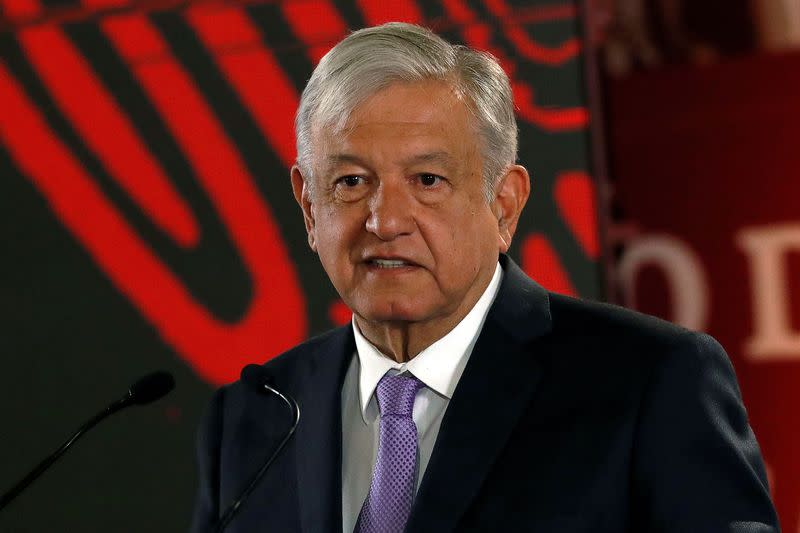Hostile crowds a factor in equal pay row: US federation
AFP•March 10, 2020

Police watch over fans during a World Cup qualifier between the
USA and Mexico at Mexico City's Azteca Stadium
(AFP Photo/BRIAN BAHR)
Los Angeles (AFP) - The United States Soccer Federation says that having to play regularly in front of hostile crowds in Mexico and Central America is one reason why the US men's national team should be treated differently to their female counterparts.
In a filing made in a federal court in Los Angeles on Tuesday, the USSF said the fact that the men's team routinely plays in intimidating arenas showed that their jobs were different to the women's team.
The United States women's team is suing the USSF, accusing the federation of gender discrimination and demanding $66 million in back pay under the Equal Pay Act and the Civil Rights Act.
Both sides have requested a summary judgement from the judge presiding in the case, seeking a ruling in their favour before the May 5 trial in Los Angeles.
In its submission filed Tuesday, the USSF argues that the different work environments of the men's and women's teams was a reason why their jobs could not be regarded as the same under the Equal Pay Act.
"(Mens National Team) players routinely play matches (important World Cup qualifiers, in particular) throughout Mexico, Central America and the Caribbean," the filing says. "The WNT (Women's National Team) does not."
"Opposing fan hostility encountered in these MNT road environments, especially in Mexico and Central America, is unmatched by anything the WNT must face while trying to qualify for an important tournament.
"Even the hostility of fans at home crowds for the MNT in some friendlies can be unlike anything the WNT faces. This is all evidence of substantially different jobs under the EPA (Equal Pay Act)."
- 'More responsibility' -
The filing also argues that the job of a men's soccer player "carries more responsibility within US soccer than the job of a WNT player, from an Equal Pay Act standpoint."
Lawyers for the USSF cite television ratings to back the claim, arguing that US men's national team games have attracted more than three times the number of viewers per game than women's games since 2017.
On Saturday, USSF president Carlos Cordeiro released an open letter stating that the federation had "offered to provide identical compensation to our women's and men's players for all matches controlled by US Soccer."
But Cordeiro said the issue of $66 million in back pay related to disparities in prize money awarded by FIFA for the men's and women's World Cups -- an amount that the USSF could not afford to make up.
Germany won $35 million for their victory in the 2014 World Cup while France earned $38 million after triumphing in Russia in 2018.
The United States women, victors in the 2015 and 2019 World Cups, earned total prize money of $6 million over the two tournaments.
"There is indeed a significant difference in World Cup prize money awarded by FIFA to the men's and women's championship teams," Cordeiro wrote.
"However it is not reasonable or fiscally sound for US Soccer to make up the gap. It would seriously impair our ability to support our mission."
Los Angeles (AFP) - The United States Soccer Federation says that having to play regularly in front of hostile crowds in Mexico and Central America is one reason why the US men's national team should be treated differently to their female counterparts.
In a filing made in a federal court in Los Angeles on Tuesday, the USSF said the fact that the men's team routinely plays in intimidating arenas showed that their jobs were different to the women's team.
The United States women's team is suing the USSF, accusing the federation of gender discrimination and demanding $66 million in back pay under the Equal Pay Act and the Civil Rights Act.
Both sides have requested a summary judgement from the judge presiding in the case, seeking a ruling in their favour before the May 5 trial in Los Angeles.
In its submission filed Tuesday, the USSF argues that the different work environments of the men's and women's teams was a reason why their jobs could not be regarded as the same under the Equal Pay Act.
"(Mens National Team) players routinely play matches (important World Cup qualifiers, in particular) throughout Mexico, Central America and the Caribbean," the filing says. "The WNT (Women's National Team) does not."
"Opposing fan hostility encountered in these MNT road environments, especially in Mexico and Central America, is unmatched by anything the WNT must face while trying to qualify for an important tournament.
"Even the hostility of fans at home crowds for the MNT in some friendlies can be unlike anything the WNT faces. This is all evidence of substantially different jobs under the EPA (Equal Pay Act)."
- 'More responsibility' -
The filing also argues that the job of a men's soccer player "carries more responsibility within US soccer than the job of a WNT player, from an Equal Pay Act standpoint."
Lawyers for the USSF cite television ratings to back the claim, arguing that US men's national team games have attracted more than three times the number of viewers per game than women's games since 2017.
On Saturday, USSF president Carlos Cordeiro released an open letter stating that the federation had "offered to provide identical compensation to our women's and men's players for all matches controlled by US Soccer."
But Cordeiro said the issue of $66 million in back pay related to disparities in prize money awarded by FIFA for the men's and women's World Cups -- an amount that the USSF could not afford to make up.
Germany won $35 million for their victory in the 2014 World Cup while France earned $38 million after triumphing in Russia in 2018.
The United States women, victors in the 2015 and 2019 World Cups, earned total prize money of $6 million over the two tournaments.
"There is indeed a significant difference in World Cup prize money awarded by FIFA to the men's and women's championship teams," Cordeiro wrote.
"However it is not reasonable or fiscally sound for US Soccer to make up the gap. It would seriously impair our ability to support our mission."
---30---




















